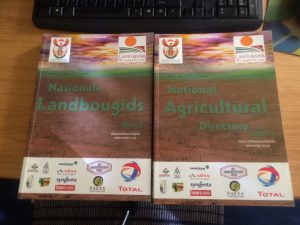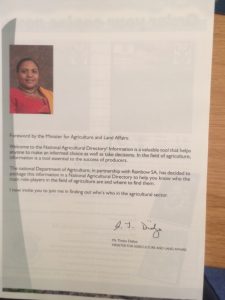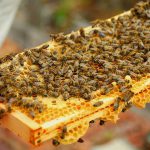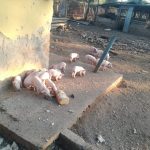
The face of Thoko Didiza greeted anyone who opened the 2004/2005 National Agricultural Directory and its Afrikaans brother, the Nasionale Landbougids, our first agricultural publication. At that time Didiza was the Minister of Agriculture and Land Affairs, a position she retained through two terms, from 1999 to 2006.


By all accounts she was a competent administrator and shrewd negotiator. We remember the stir in the crowd at an Agri SA congress when she stated that the 30% target of agricultural land to be in black hands by 2014 excluded the former homelands. (A target which included these areas would have been easier to reach). She also drove a hard bargain with AgriBEE. Yet at the last function with organised agriculture, one attendee described the atmosphere caused by the prospect of her imminent departure as being similar to a funeral. She had been a respected, even popular face of government.
Her prospects and challenges are well set out in an article by Mzukisi Qobo and Wandile Sihlobo in “Can Thoko Didiza unlock the Pandora’s Box of land reform and agriculture?” Further reading includes the Agbiz response to the new cabinet, the Farmer’s Weekly article “Agri sector welcomes new minister Thoko Didiza” and Landbouweekblad’s “Didiza opgewonde om terug by landbou te wees” [Didiza excited to be back at agriculture].
A look at the role agriculture played in rescuing South Africa from technical recession in several quarters over the last five years shows it to be a vital sector. Lately it is credited with only 2.5% of GDP but – wow! – does agriculture punch above its weight!
Africa Check places the figure of white owned farmland at 64.8 million hectares, or 53% of total land. How are we going to arrive at a more representative figure without upsetting the proverbial apple cart?
Expropriation without compensation (EwC)? You have to be careful with that one. It will carry the almost certain consequence of collapsing the agricultural economy. Not having title or property rights places limitations on farmers accessing finance and leaves them carrying “a dead asset”, as Zimbabwean Finance and Economic Development Minister Mthuli Ncube is reported to have said recently (Kuyedzwa, 2019).
Agriculture is “a strategic economic sector” that takes us past social imperatives like food security, job creation and rural stability to economic growth and inclusion, and earning foreign exchange (Qobo & Sihlobo, 2019). Policy interventions are inevitable, but they should be done with cool heads. Didiza is back. They don’t come cooler than this.



Share this article







